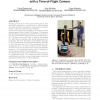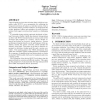725 search results - page 82 / 145 » Learning Behaviors Models for Robot Execution Control |
JMLR
2010
13 years 3 months ago
2010
With the goal to generate more scalable algorithms with higher efficiency and fewer open parameters, reinforcement learning (RL) has recently moved towards combining classical tec...
ICRA
1995
IEEE
14 years 9 days ago
1995
IEEE
A generic architecture for evolutive supervision of robotized assembly tasks is presented. This architecture , at different levels of abstraction, functions for dispatching action...
HRI
2011
ACM
13 years 6 days ago
2011
ACM
Pointing gestures are a common and intuitive way to draw somebody’s attention to a certain object. While humans can easily interpret robot gestures, the perception of human beha...
ICRA
2008
IEEE
14 years 3 months ago
2008
IEEE
For complex robotic tasks (manipulation, locomotion, haptics, ...), the lack of knowledge of precise interaction models, the difficulties to precisely measure the task associated ...
EMSOFT
2006
Springer
14 years 12 days ago
2006
Springer
Upper bounds on worst-case execution times, which are commonly called WCET, are a prerequisite for validating the temporal correctness of tasks in a real-time system. Due to the e...


